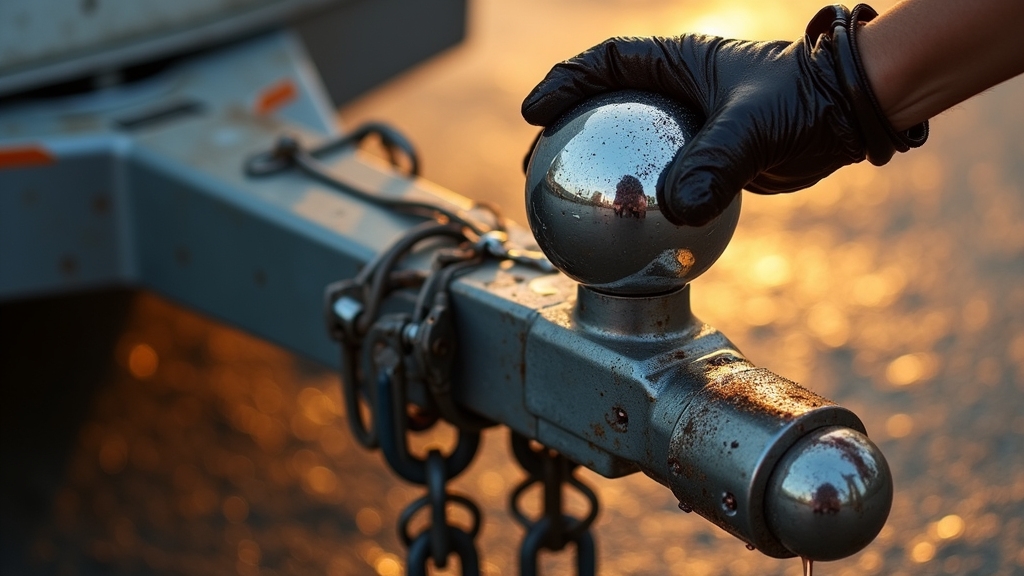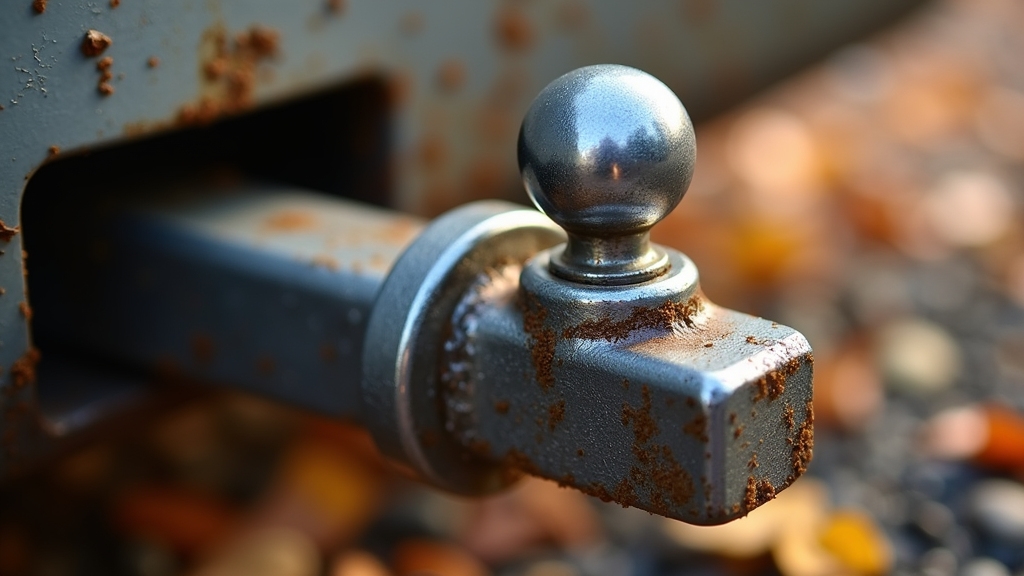You should grease your ball hitch to reduce friction, prevent wear, and stop rust or corrosion. Applying a thin layer of water-resistant grease makes hitching and unhitching smoother while lowering noise and metal damage during towing.
Use white lithium grease and avoid overapplying to keep dirt buildup minimal. Proper lubrication also improves safety by ensuring a secure connection. To understand how to maintain your hitch for the best performance and durability, keep exploring the details.
Key Takeaways
- Greasing a ball hitch reduces friction, making hitching and unhitching easier and smoother.
- Proper lubrication prevents rust, corrosion, and metal wear, extending the hitch’s lifespan.
- Applying grease minimizes noise and vibration during towing for a quieter ride.
- Use water-resistant, non-toxic grease sparingly on the ball’s surface, avoiding inside the coupler socket.
- Regular cleaning and reapplication of grease maintain safety, reliability, and optimal hitch performance.
Benefits of Applying Grease to a Ball Hitch

When you apply grease to a ball hitch, you considerably reduce friction between the ball and coupler, making hitching and unhitching much easier. This lubrication minimizes the force needed to connect or disconnect your trailer, preventing sticking or binding issues that can occur without proper grease.
You’ll find the process less physically demanding, especially with heavier trailers, as the coupler moves smoothly over the ball. Grease also helps prevent the coupler from seizing onto the ball over time, ensuring reliable performance.
Additionally, it dampens metal-on-metal noise during towing, reducing squeaks and clunks. This smoother interaction lowers vibration and noise, improving comfort during turns or rough road conditions.
Applying grease is a practical step to enhance ease and quietness in your towing experience. It also protects the ball against rust and corrosion, extending its lifespan.
How Grease Affects Wear and Longevity of Tow Balls?
Although grease attracts dirt, its role in reducing friction between the tow ball and coupler is crucial for minimizing wear.
By forming a protective barrier, grease reduces direct metal-to-metal contact, cutting abrasion and material loss. This smooth interaction prevents surface scoring and pitting, extending the functional life of both components.
Using inverter technology in generators similarly helps extend equipment life by providing clean and stable power, highlighting the importance of proper maintenance. Grease creates a protective barrier that minimizes metal contact, reducing wear and extending component life.
However, grease also traps dust and debris, creating a gritty paste that accelerates abrasive wear if not cleaned regularly. Properly cleaning the hitch ball with fine-grit sandpaper and alcohol before lubrication is essential to maintain its condition.
To maximize longevity, you must maintain a strict cleaning and regreasing schedule, especially in dusty or harsh environments.
Choosing the right lubricant and adjusting maintenance frequency based on usage conditions ensures ideal wear reduction and prolongs tow ball service life without compromising fit or function.
Preventing Rust and Corrosion With Proper Lubrication
Since rust compromises the structural integrity of trailer hitch balls, you must apply proper lubrication to prevent corrosion effectively. Lubricants create a protective film that blocks moisture, salt, and contaminants, reducing rust formation.
Regularly applying corrosion-resistant lubricants maintains safety and prolongs hitch life by preventing pitting and surface degradation. A unique gel formulation ensures the lubricant stays in place, avoiding messes and maintaining protection longer.
Choosing a lubricant with waterproof properties enhances its effectiveness in outdoor environments.
| Lubricant Type | Corrosion Resistance | Application Benefit |
|---|---|---|
| Gel-based Lube | Adheres well, resists wash-off | Consistent protection |
| Anti-friction Grease | Durable, high-load resistance | Long-lasting corrosion barrier |
| Wax-based Protectant | Dries to repel water | Extended protection |
| Rust Inhibitor Fluid | Prevents further corrosion | Restores previously rusted areas |
Use these lubricants to shield your hitch ball from environmental threats and maintain ideal towing safety.
Recommended Products and Best Practices for Greasing
Proper lubrication plays a key role in preventing rust and corrosion on your trailer hitch ball, but choosing the right products and applying them correctly guarantees ideal performance. Selecting lubrication compatible with the tire’s load capacity can further enhance towing safety.
Use water-resistant, non-toxic white lithium grease like REESE Towpower Hitch Ball Lube, designed for all couplers and backed by a one-year warranty.
Apply a thin, even layer only to the exterior of a clean hitch ball. Avoid over-application to prevent dirt buildup. This grease is non-toxic white grease suitable for outdoor use, ensuring durability.
Do not grease inside the coupler socket as it may impair locking mechanisms. Regularly inspect and reapply lubricant, especially after exposure to water or rough conditions.
Wipe off excess grease to minimize mess and contamination. Following these precise steps helps reduce friction, extend component life, and ensure smooth, quiet towing with perfect safety compliance.
Potential Drawbacks and How to Manage Grease Mess
When you grease a ball hitch, you’ll often face challenges like dirt attraction and messy buildup that can degrade performance and complicate maintenance. Traditional greases collect dirt and debris, creating sticky layers that transfer to hands and gear.
Traditional grease attracts dirt, forming sticky layers that leave residue on your hands and equipment. Excess grease can drip, soiling vehicles or storage areas and spreading via wind or rain.
To manage this, use plastic tow ball caps or durable covers to shield the grease, but replace them regularly to avoid moisture entrapment. Applying grease sparingly and only to key wear points limits mess.
Alternatively, consider dry lubricants like PTFE sprays, which eliminate dirt adhesion but need frequent reapplication. Dry graphite spray is an effective alternative that forms a dry, adherent film reducing mess and improving wear resistance. dry graphite spray
Frequent cleaning to remove old grease and dirt is essential. Regular maintenance and choosing a grease with water resistance can significantly reduce the frequency and severity of these issues. Proper management reduces buildup, protects components, and keeps your hitch functioning smoothly without excessive mess.
Impact of Greasing on Towing Safety and Performance
Hey there! Did you know that greasing your ball hitch can really make a difference? It cuts down on that annoying metal-on-metal noise while you’re towing, which is a huge plus! Proper lubrication also helps reduce wear, which is crucial for maintaining towing performance.
Plus, with that lubrication in place, your hitch connection becomes way more reliable. This means your trailer is more likely to stay securely fastened, no matter what kind of road conditions you encounter.
Regular greasing also helps prevent rust and corrosion, keeping your tow ball in good condition for longer. And here’s the thing: keeping that layer of grease maintained is super important. It’s all about safety and consistency when you’re out on the road.
Noise Reduction Benefits
Although often overlooked, greasing the ball hitch plays a crucial role in reducing metal-on-metal noise during towing. When you apply grease, it forms a lubricating barrier between the tow ball and coupler. This barrier dampens grinding, squeaks, and rattling.
This friction reduction leads to smoother trailer tongue movement inside the coupler, minimizing vibration noise. Proper maintenance practices, similar to those recommended for RV toilet waste management, help extend the lifespan of towing components.
Without proper lubrication, metal contact produces audible grinding that can distract and irritate you and your passengers.
Additionally, a greased hitch absorbs jolts and prevents harsh impacts, contributing to quieter overall towing. Using a noise-reduction technology hitch like the Fastway Silent Towing Ball Mount further enhances this effect by securing the ball mount tightly to reduce clanking.
By maintaining this lubrication, you ensure consistent noise reduction, improving your towing experience and safety. Grease also helps protect components from wear and corrosion, further stabilizing performance and preventing noisy degradation over time.
Hitch Connection Reliability
Since reliable hitch connection is critical for safe towing, greasing the ball hitch considerably enhances both safety and performance.
Applying grease reduces friction between the ball and coupler, ensuring smooth connection and disconnection while preventing seizing or sticking. This lubrication supports secure locking, minimizing accidental detachment risks.
It also facilitates easier connection and disconnection of the trailer coupler, making the process more efficient. Using high-quality grease can also improve durability under extreme conditions.
Additionally, grease protects against metal wear and corrosion, extending component lifespan and maintaining structural integrity. It also facilitates consistent coupler movement across varied terrains and weather conditions, enhancing overall towing reliability.
Key benefits include:
- Easier alignment and secure seating of the coupler, reducing misconnection risks.
- Protection from abrasion and rust, which preserves hitch durability.
- Reduced chances of coupler binding or jamming, improving operational safety.
Regular greasing before each tow session is essential for dependable hitch performance.
Frequently Asked Questions
Can I Use Automotive Grease Instead of Trailer-Specific Hitch Grease?
Yes, you can use automotive grease instead of trailer-specific hitch grease, especially if it’s lithium-based and designed for outdoor use. Just verify it has good water resistance and tackiness to stay put under load.
While trailer-specific grease often offers superior extreme pressure additives and washout resistance, quality automotive grease works well for casual towing if applied regularly.
For heavy-duty use, stick to specialized hitch grease to protect components and maintain warranty compliance.
How Often Should I Remove Old Grease Before Reapplying New Grease?
Every 3 to 6 months, you should strip away old grease before applying new. Like turning pages in a well-used book, old grease can become gritty, dry, or contaminated, hindering smooth operation.
If you tow frequently or face dusty, wet conditions, clean more often. Always inspect before towing; if rust or moisture lurks beneath, don’t delay. Removing buildup guarantees your hitch performs safely and efficiently.
Does Greasing a Ball Hitch Affect Warranty Coverage on My Trailer?
Greasing your ball hitch won’t void your trailer’s warranty; manufacturers actually recommend it as part of routine maintenance.
Proper lubrication prevents rust and wear, helping maintain warranty eligibility. Just make sure you use the correct grease and follow maintenance guidelines.
Neglecting lubrication or using improper products can lead to damage that warranties typically exclude.
Can Greasing a Ball Hitch Prevent Trailer Sway During Towing?
No, greasing a ball hitch won’t prevent trailer sway during towing. Sway results from factors like improper weight distribution, aerodynamic forces, or incorrect hitch setup, not lubrication.
While greasing reduces friction, making hitching smoother and preventing wear, it doesn’t affect sway control.
To minimize sway, focus on proper tongue weight. Use weight distribution hitches with anti-sway features or install electronic stability systems designed specifically to reduce lateral movement.
Is It Safe to Grease a Ball Hitch in Freezing Temperatures?
Yes, you can safely grease a ball hitch in freezing temperatures, but choose a high-quality lubricant designed for cold conditions. Apply it sparingly to avoid buildup that attracts dirt and moisture, which can freeze and cause stiffness.
Regularly clean and inspect the hitch to maintain smooth operation. Avoid expired grease and store components in a dry place to prevent corrosion and guarantee peak performance throughout winter.
Messy But Manageable: Tips for Clean Hitch Maintenance
You might wonder if greasing your ball hitch is really necessary, but the truth is clear: applying grease greatly reduces wear, prevents rust, and guarantees smoother towing performance.
While it can get messy, using the right lubricant and cleaning techniques keeps it manageable. By greasing your ball hitch regularly, you extend its lifespan and enhance safety, making your towing experience more reliable and efficient.
Don’t skip this simple but essential maintenance step.



